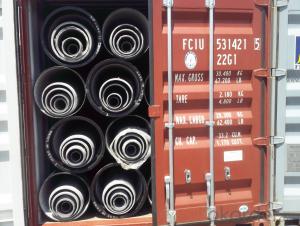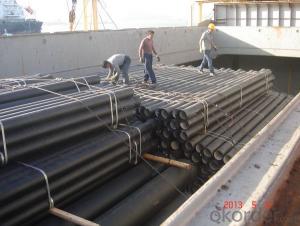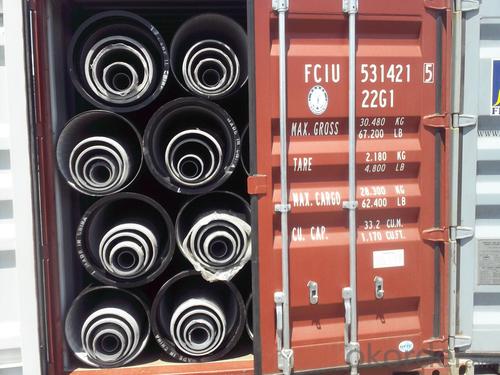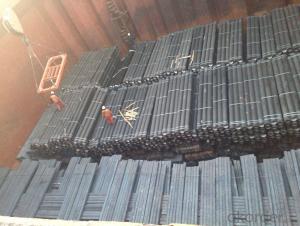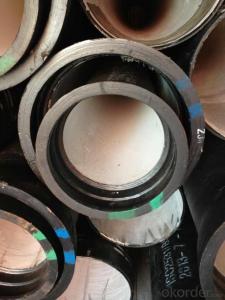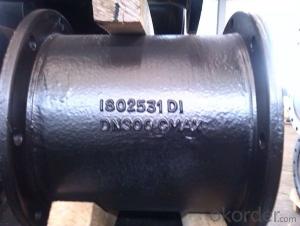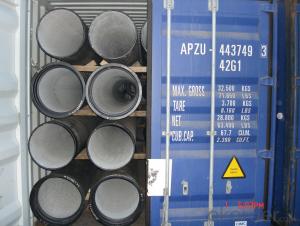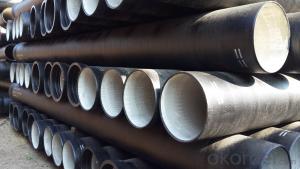DUCTILE IRON PIPE DC Class DN 350
- Loading Port:
- Tianjin
- Payment Terms:
- TT OR LC
- Min Order Qty:
- -
- Supply Capability:
- 30000Tons m/month
OKorder Service Pledge
OKorder Financial Service
You Might Also Like
CNBM ductile iron pipe ranges from DN80-DN1600mm (T-Type, Class K9), effective length 6m, comply with ISO2531 Standard
Company Profile
CNBM International Corporation is the leading production base and renowned supplier of Ductile Iron Water Pipe systems of both potable and waste water in China. We are constantly looking to develop high quality products to ensure the longest service life and wonderful performance.
CNBM Pipelines regard quality as the essential factor leading to successful business. Every pipe is tested in accordance with BS EN545 (water application) or BS EN598 (sewer application). CNBM Pipelines products comply with and are tested according to the relevant European and International Standards. Our pipes are manufactured under the quality management system BS EN ISO 9001. After years of efforts, CNBM Pipelines has built up great reputation in terms of quality and service among customers worldwide
Product Introduction
CNBM ductile iron pipe ranges from DN80-DN1600mm (Tyton, T-Type, Class K7/K8/K9), effective length: 6m, complying with BS EN545/EN598/ISO2531/BS4772.
Specification& Payment terms
Internal lining: Pipes shall have an internal cement mortar lining in acc with ISO4179.
External coating: Pipes shall be externally coated with metallic zinc spray plus a further layer of resin painting to ISO8179.
Gasket: 100% SBR/NBR/EPDM gasket in accordance with ISO4633.
Packing: Pipes from DN100 to DN300 be bundled with steel belts, the others are in bulk.
Payment term: By 30% T/T advance payment + 70% Irrevocable L/C at sight.
Packing: In bulk vessel or in container.
- Q: Can ductile iron pipe be repaired if it gets damaged?
- If ductile iron pipe sustains damage, it can indeed be repaired. The process of repair entails the removal of the damaged section and the subsequent substitution with a fresh section. Typically, a pipe cutter, a specialized tool, is utilized to achieve a seamless cut on both ends of the affected area. Once the damaged portion is extracted, a new section of ductile iron pipe is affixed securely by employing mechanical couplings or welding. To safeguard the pipe's integrity and functionality, it is crucial to adhere to the manufacturer's guidelines and industry standards during the repair procedure.
- Q: When the ductile iron pipe is pressed, the three links are always running out. What should be done?
- If the conventional backfill soil pressure, pipe fittings installed properly, the phenomenon will not appear.
- Q: Can ductile iron pipes be used in agricultural applications?
- Yes, ductile iron pipes can be used in agricultural applications. Ductile iron pipes are known for their strength, durability, and corrosion resistance, making them suitable for various agricultural uses such as irrigation systems, water supply networks, and drainage systems. They can withstand high pressure, handle heavy loads, and are also resistant to external factors like soil movements and root penetration.
- Q: How much is the installation of cast iron pipe drainage 1 meters?
- Water supply pipe is the first choice, with high cost performance. Compared with the PE pipe, from the installation time, ductile pipe PE pipe installation is simple and rapid, and after the installation of internal and external bearing pressure better;
- Q: How long does the cast iron pipe of indoor direct buried sewage need to be examined?
- Indoor drainage of the majority of households are using cast iron pipe, if the distance from the sewage well is relatively close, and the above does not take the car, you can consider the U-PVC.
- Q: How do ductile iron pipes handle soil erosion?
- Ductile iron pipes are known for their exceptional strength and durability, making them highly resistant to soil erosion. The material used in ductile iron pipes is specifically engineered to withstand the effects of soil erosion, ensuring a long-lasting and reliable infrastructure. The composition of ductile iron pipes includes a mix of iron, carbon, and other alloying elements, which provides the necessary strength and resilience to withstand the forces exerted by soil erosion. These pipes have a higher tensile strength than traditional cast iron pipes, allowing them to resist deformation and cracking under pressure. Furthermore, ductile iron pipes have a protective layer called cement mortar lining, which acts as a barrier between the pipe and the surrounding soil. This lining provides an additional layer of resistance against corrosion and erosion caused by the soil's chemical composition or abrasive particles. As a result, ductile iron pipes remain intact and continue to function effectively even in areas with high soil erosion rates. In terms of installation, ductile iron pipes are designed to be buried underground, ensuring that they are well-protected from direct contact with the soil. Additionally, their jointing systems are designed to provide a secure and watertight connection, minimizing the risk of soil infiltration and subsequent erosion. Overall, ductile iron pipes have a proven track record of effectively handling soil erosion due to their superior strength, protective linings, and appropriate installation techniques. They offer a reliable and long-lasting solution for water and wastewater infrastructure, even in areas prone to soil erosion.
- Q: Can ductile iron pipes be used in earthquake-prone areas?
- Ductile iron pipes are suitable for use in areas prone to earthquakes. This material, known for its strength and flexibility, can withstand the movement and vibrations caused by seismic activity. Its exceptional ductility means it can deform under stress without fracturing or breaking. Consequently, ductile iron pipes are capable of absorbing the energy produced during an earthquake, minimizing the risk of pipe failure or rupture. Moreover, these pipes have a proven track record in seismic zones, attesting to their resilience and dependability in such regions. Nevertheless, it is crucial to emphasize the importance of proper installation and design considerations, including the use of appropriate jointing methods and ensuring adequate anchoring. These factors are crucial to guarantee the optimal performance of ductile iron pipes in earthquake-prone areas.
- Q: How are ductile iron pipes different from other types of pipes?
- Ductile iron pipes are different from other types of pipes primarily due to their enhanced strength and durability. Unlike traditional cast iron pipes, ductile iron pipes have a higher tensile strength and can withstand higher internal and external pressures. They are also less prone to cracking or breaking under heavy loads or impact, making them suitable for both above-ground and underground applications. Additionally, ductile iron pipes offer superior resistance to corrosion, which increases their lifespan and reduces maintenance requirements compared to other pipe materials.
- Q: What are the different sizes available for ductile iron pipes?
- Ductile iron pipes, also known as DI pipes, are available in a wide range of sizes to suit various applications and requirements. The sizes of ductile iron pipes typically range from DN 80 (3 inches) to DN 2600 (104 inches) in diameter, with various wall thicknesses. For smaller diameters, such as DN 80 to DN 300, ductile iron pipes are commonly available in standard lengths of 5.5 meters or 6 meters. As the diameter increases, the standard lengths may also increase, reaching up to 7 meters or even longer for larger sizes. The commonly used sizes of ductile iron pipes include DN 80, DN 100, DN 150, DN 200, DN 250, DN 300, DN 350, DN 400, DN 450, DN 500, DN 600, DN 700, DN 800, DN 900, DN 1000, DN 1200, DN 1400, DN 1600, DN 1800, DN 2000, DN 2200, DN 2400, DN 2600, and many more. It is important to note that the availability of different sizes may vary depending on the manufacturer and the specific region or country. Additionally, custom sizes can also be manufactured to meet specific project requirements. When selecting the appropriate size of ductile iron pipes, it is crucial to consider factors such as the flow rate, pressure, and intended application to ensure optimal performance and durability. Consulting with industry professionals or referring to relevant standards and guidelines can help in determining the appropriate size for a specific project.
- Q: Is the ambient temperature at minus 20 degrees better with grey cast iron or ductile iron?
- Heavy thermal and mechanical shock, high temperature or low temperature, corrosion resistance and dimensional stability. To meet these changes in use conditions, ductile iron is available in many grades, providing a wide range of mechanical and physical properties.
Send your message to us
DUCTILE IRON PIPE DC Class DN 350
- Loading Port:
- Tianjin
- Payment Terms:
- TT OR LC
- Min Order Qty:
- -
- Supply Capability:
- 30000Tons m/month
OKorder Service Pledge
OKorder Financial Service
Similar products
Hot products
Hot Searches
Related keywords
